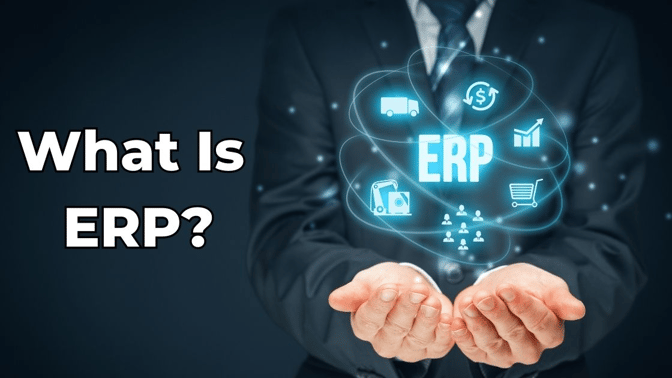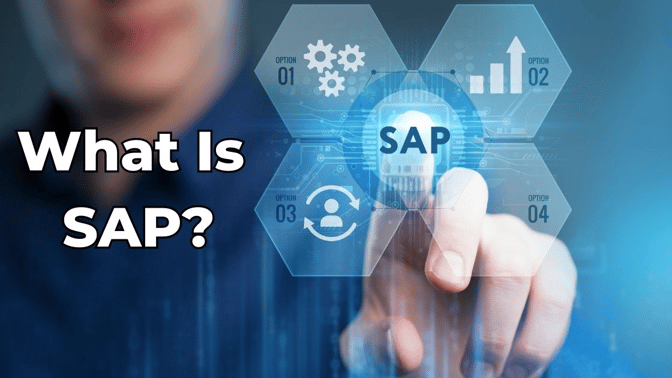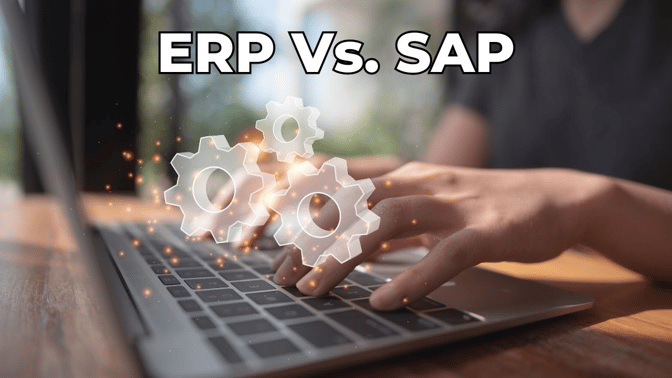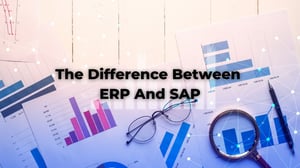In the ever-evolving landscape of modern business, people toss around terms like ERP and SAP like confetti at a New Year’s Eve party. But do you ever find yourself wondering what these mysterious acronyms mean and how they differ from one another? Fear not, for you have come to the right place.
Prepare to be enlightened as we unravel the secrets of enterprise resource planning, uncover the true essence of SAP, and journey through the subtle nuances that set these titans apart in the realm of business management software. So, buckle up and get ready for a thrilling ride as we embark on this epic quest to conquer the often-confusing world of ERP and SAP.
What is ERP and How Does it Work?

Enterprise Resource Planning (ERP) is a type of business management software that integrates and streamlines various core business processes. Such core business processes can include finance (accounting), retail management, field service, inventory management, reporting, customer relationship management, and manufacturing.
Organizations can improve their overall efficiency and decision-making capabilities by consolidating all these functions into a single, centralized system.
An ERP system provides a unified platform for data sharing and collaboration among different departments, enabling them to operate more cohesively. This real-time access to data allows managers and executives to make informed decisions based on accurate, up-to-date information.
Additionally, ERP systems can automate many repetitive tasks, freeing up valuable time and resources for more strategic initiatives.
In short, the primary goal of an ERP system is to optimize business operations, reduce costs, and enhance productivity, ultimately contributing to a company’s growth and competitiveness in the market.
What is SAP and What is it Used For?

SAP, which stands for Systems, Applications, and Products in Data Processing, is a German multinational software corporation specializing in developing and marketing enterprise software solutions. Among its wide array of software products, SAP is best known for its ERP systems, designed to help businesses manage their operations more efficiently and effectively.
Like other ERP software, the SAP-ERP system is a comprehensive solution that integrates various business functions into a single platform, such as finance, logistics, human resources, and customer relationship management. By unifying these processes, the SAP-ERP system facilitates seamless data exchange and collaboration between departments, ultimately promoting more informed decision-making and improved overall performance.
In addition to its flagship ERP solutions, SAP offers a range of industry-specific and specialized software products tailored to meet the unique needs of various sectors, including retail, healthcare, manufacturing, and more.
Furthermore, SAP has embraced the growing trend of cloud-based solutions, providing businesses with flexible and scalable options that cater to their evolving needs.
Businesses use SAP to streamline and optimize business processes, enhance productivity, and support strategic growth initiatives through its various software offerings, particularly its ERP systems.
ERP vs. SAP

People often use the terms SAP and ERP interchangeably, but it’s crucial to understand the difference between SAP and ERP to avoid confusion. While ERP is a broad category of business management software solutions designed to integrate and streamline various business functions, SAP is a specific company that develops and offers its own ERP systems, among other software products.
SAP is one of the leading providers of ERP software in the market, with its flagship product, SAP-ERP, being utilized by many organizations worldwide. However, SAP is one of many ERP providers, and several other companies offer ERP systems with unique features and capabilities. Some popular alternatives to SAP include Evosus, Microsoft Dynamics, and Oracle.
Let’s look at the differences between SAP and ERP in the table below.
|
Parameters |
ERP |
SAP |
|
Full Name |
ERP stands for Enterprise Resource Planning |
SAP stands for Systems, Applications, and Products |
|
Vendor |
Evosus (LOU), Oracle, Microsoft Dynamics, SAP, and more. |
SAP AG |
|
Definition |
It’s a type of business management software that integrates and streamlines various core business processes. |
It’s a German multinational software corporation specializing in developing and marketing enterprise software solutions. |
|
Correlation |
ERP is a superset of SAP. |
SAP is a company that develops ERP systems. |
|
Mode Of Application |
ERP connects all of a business's applications into a single architecture. |
SAP provides an ERP system that consolidates information and data on a single database for businesses. |
|
Basics |
ERP is a tool used for managing business processes across various industries, utilizing modules to handle a company's internal processes. |
SAP refers to products from the SAP AG company, which offers an integrated SAP-ERP solution to streamline processes related to manufacturing, sales, procurement, service, human resources, and finance. |
|
Features |
Basic features of ERP include:
|
Basic features of SAP include:
|
When comparing SAP vs. ERP, it’s essential to remember that SAP is an example of an ERP system rather than a separate category. The primary differences lie in the specific features, functionalities, and pricing models each ERP provider offers.
Organizations must carefully assess their individual needs, budget, and long-term goals when choosing an ERP solution, regardless of whether SAP or another software company developed it.
While SAP is a prominent player in the ERP market, it is just one of many available options. Therefore, businesses must weigh the pros and cons of different ERP systems to determine the best fit for their unique requirements.
Conclusion
Navigating the world of business management software can be a challenging endeavor, especially when faced with the nuances between ERP and SAP. But fear not, intrepid business leader, for we have unraveled the mysteries for you.
By now, you should have a clearer understanding of ERP as a category of software solutions, with SAP being one of the many providers in the market. However, while SAP is undoubtedly a popular choice, it’s essential to remember that there’s an entire galaxy of ERP systems, each with unique features and strengths.
In your quest for the perfect ERP solution, we encourage you to boldly explore all available options and find the one that aligns with your organization’s unique needs and goals. A great place to start is at Evosus, your all-in-one business management software. Book a demo with Evosus today.


